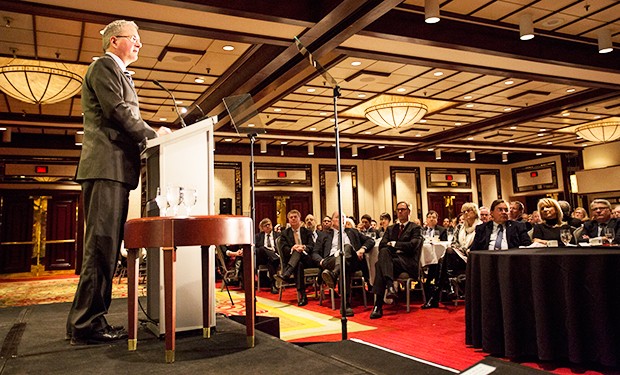Today’s students, tomorrow’s global citizens
 Alan Shepard at the Canadian Club of Montreal. | Photos by Concordia University
Alan Shepard at the Canadian Club of Montreal. | Photos by Concordia University
Globalization isn’t just a theory; it’s an all-consuming fact. The next generation needs to be prepared for a globalized landscape that is constantly shifting. And the only way to ride the wave is to improvise — to be nimble.
This is the context in which Concordia president Alan Shepard addressed the Canadian Club of Montreal on February 2, and he challenged the more than 300 guests from industry and academia to join him for the ride.
“Once upon a time, a student retreated into university to prepare for the world,” Shepard said. “Today, students study and work, prepare and engage, all at once.”
With economic and societal change coming so rapidly, it’s necessary to prepare the next generation for a plunge into uncharted waters. But how?
Shepard offered three suggestions: provide more hands-on work experience during the course of study; enhance a culture of volunteerism at home; and help young people become engaged global citizens.
Increasing hands-on experience
Classic co-operative education programs combine classroom theory with workplace practice, providing initial stability and giving a young person the chance to test drive a career before committing to it.
There is also a lot of evidence that through co-op, the learning is deeper, marks are generally higher and the probability of completing a degree are higher.
With the rise of innovation and entrepreneurship, why not combine co-op with incubators? Shepard proposed that businesses create incubators for students and recent graduates within their spaces, where industry experience and mentoring are on tap.
Enhancing a culture of volunteerism
Students have three very valuable assets — time, energy and passion — that can benefit both the individual and society as a whole.
Montreal is Canada’s top student city, with over 225,000 post-secondary scholars.
“Imagine if each one of them contributed 25 hours per year,” Shepard said. “That’s just two hours a month, or three Saturdays a year. But it adds up to more than five million hours of community service, every year. Suddenly, micro-philanthropy would be a major movement with a massive effect.”
To support his point, Shepard quoted Governor General David Johnston: “By working to build prosperity in our communities — this is how we build a smarter, more caring and resilient society.”
Increasing global perspective
Currently, approximately 11 per cent of Canada’s undergraduate students study abroad. Shepard believes that figure must double by 2020. Germany, for example, has set a target of 50 per cent.
Employers would love to have more new hires with international experience, which can be achieved through study exchanges or through volunteer work. And although 85 per cent of students show interest in studying abroad, more than three quarters say they can’t go because it’s too expensive.
Shepard looks to AmeriCorps as a potential funding model. The U.S. domestic volunteer program reverse engineers costs: in exchange for volunteer service now, they help participants with their university tuition later.
“I might propose a version of this exchange, a ‘made-in-Canada fund,’” said Shepard. “Knowing how we love acronyms, in English it could be called LEAF — the Learning Experience Abroad Fund.
It would not be a holiday, he explained, but “a study- or volunteer-abroad sojourn that provides deep engagement with another culture, that pays dividends in the lives of our future leaders of civil society and in the society itself.”